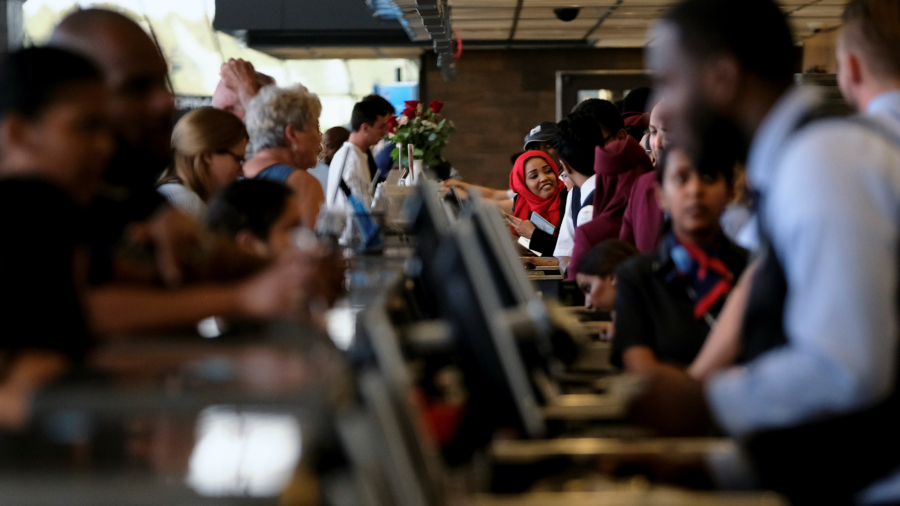WASHINGTON—New, more refined travel restrictions were issued in a proclamation by President Donald Trump late Sept. 24.Citing national security threats, Trump placed indefinite limits on citizens from eight countries traveling to the United States.
Almost all citizens of Chad, Iran, Libya, North Korea, Syria, Somalia, and Yemen will be banned from entering the United States as of Oct. 15. Some Venezuelan citizens are restricted and Iraq citizens are not subject to restrictions, but will face heightened scrutiny.
Chad, North Korea, and Venezuela are new to the list. The other countries had been named in Trump’s original 90-day visa ban announced in January and again in March in the revised version after a court injunction blocked the original ban. Restrictions were lifted on Sudan, which was also named in previous bans.
Each of the eight countries has tailor-made restrictions, but citizens from most of them will be unable to emigrate under the new ban.

The new rules do not apply to legal permanent residents of the United States, and visas already issued to citizens from those countries will not be revoked. Once the nonimmigrant visas expire, however, they will be subject to the new restrictions.
“Following an extensive review by the Department of Homeland Security, we are taking action today to protect the safety and security of the American people by establishing a minimum security baseline for entry into the United States,” President Trump said in a statement on Sept. 24.
“We cannot afford to continue the failed policies of the past, which present an unacceptable danger to our country. My highest obligation is to ensure the safety and security of the American people.”
Making America Safe is my number one priority. We will not admit those into our country we cannot safely vet.https://t.co/KJ886okyfC
— Donald J. Trump (@realDonaldTrump) September 24, 2017
The Immigration and Nationality Act states that the president may “suspend the entry of all aliens or any class of aliens” whenever he “finds that the entry of any aliens or of any class of aliens into the United States would be detrimental to the interests of the United States.”
Review Process
The Department of Homeland Security (DHS) reviewed almost 200 countries between March and July to identify those that needed to provide more information with a visa application to satisfy United States authorities that the individual is not a security or public-safety threat.
One criteria was document integrity—for example whether a country issued passports with an embedded chip or not; or whether the country could provide evidence that their citizens are who they say they are.
Other criteria include whether the country is a known or potential terrorist safe haven; whether it is a participant in the Visa Waiver Program; and whether it regularly fails to receive its nationals subject to final orders of removal from the United States.
The DHS initially identified 16 countries as being “inadequate” and 31 additional countries as “at risk” of becoming “inadequate” based on those criteria.
The State Department then spent 50 days engaging with those countries to help them meet the criteria and avoid travel restrictions.
“Those engagements yielded significant improvements in many countries,” the proclamation states. “Twenty-nine countries, for example, provided travel document exemplars for use by Department of Homeland Security officials to combat fraud. Eleven countries agreed to share information on known or suspected terrorists.”
Exceptions
Officials said waivers can be granted on a case-by-case basis if denying entry would cause the foreign national undue hardship; and if allowing entry would not pose a threat to the national security or public safety of the United States; and if entry would be in the national interest.
Individuals with close family ties in the United States could be exempt from the restrictions.
More than one million immigrants from more than 150 countries are provided with permanent residency in the United States every year with a path to citizenship, according to DHS.
The United States Citizenship and Immigration Services has an asylum backlog of more than 270,000 people.
Many of those immigrating and traveling to the United States come from areas with serious terrorism concerns, significant instability, substantial stresses on public systems, and other security and safety threats, the administration said.
“The restrictions and limitations imposed by this proclamation are, in my judgment, necessary to prevent the entry of those foreign nationals about whom the United States Government lacks sufficient information to assess the risks they pose to the United States,” Trump said.
The travel restrictions can be lifted from the countries at any time, once the criteria has been satisfactorily met, Trump said.
8 Countries With Restrictions*
The restrictions distinguish between immigrants and nonimmigrants, because immigrant visas lead to lawful permanent resident status.
“Lawful permanent residents are more difficult to remove than nonimmigrants even after national security concerns arise, which heightens the costs and dangers of errors associated with admitting such individuals,” the proclamation states.
North Korea, Syria
Immigrant and nonimmigrant entries are suspended.
Chad, Libya, Yemen
Immigrant entries are suspended.
Nonimmigrants on business (B-1), tourist (B-2), and business/tourist (B-1/B-2) visas are suspended.
Iran
Immigrant entries are suspended.
Nonimmigrant entries are suspended, except those with valid student (F and M) and exchange visitor (J) visas—although they’re subject to enhanced vetting.
Somalia
Immigrant entries are suspended.
Nonimmigrant visa adjudications are subject to additional scrutiny.
Venezuela
Officials of government agencies involved in screening and vetting procedures and their immediate family members, as nonimmigrants on business (B-1), tourist (B-2), and business/tourist (B-1/B-2) visas are suspended.
Other visa holders are subject to additional measures to ensure traveler information remains current.
*Iraq
While citizens of Iraq do not face travel restrictions, travelers are subject to additional scrutiny.
From The Epoch Times

